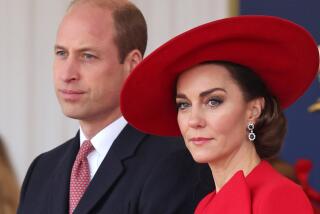Venezuelans speculate on Chavez’s absence
- Share via
Reporting from Caracas, Venezuela, and Bogota, — Venezuelan President Hugo Chavez’ hospitalization and subsequent disappearance from public view while visiting Cuba has stirred rumors about the seriousness of his medical condition and controversy over whether he should delegate power temporarily.
Chavez, 56, has not been seen in public since June 8, when he arrived in Havana on a Latin American tour. Two days later, he underwent surgery for a “pelvic abscess,” and the Venezuelan government has offered little detail on his condition.
There has been no direct public communication from Chavez since June 12, when he spoke via telephone to a state-run TV station in the Venezuelan capital, Caracas. On June 17, the Cuban government released a photo of Chavez being visited in his hospital room by Fidel and Raul Castro.
On Venezuelan Defense Minister Carlos Mata Figueroa said Thursday that he talks to Chavez every day, and that the leader is convalescing well and is “stronger than ever.”
Later in the day, the first messages in more than a week were sent from Chavez’s Twitter account, but they did not mention his health and there was no way to verify that he was the author of the tweets.
Critics such as opposition lawmaker Americo de Grazia have demanded that the government issue a daily medical bulletin on Chavez’s condition. De Grazia also said Chavez’s ongoing treatment in Cuba was an affront to Venezuelan doctors who are “characterized by professionalism.”
“No to secrecy on this issue. No to a photograph,” De Grazia told reporters last week. “Authoritarian governments send photos. In a democracy, there is information. The country wants information, not photos.”
De Grazia and others have called on Chavez to temporarily delegate powers to Vice President Elias Jaua, citing an article of the Constitution that requires presidents to transfer power in case of a “temporary absence.”
Foreign Minister Nicolas Maduro has countered that Congress’ approval for Chavez’s trip, which included stops in Brazil and Ecuador before Cuba, is all the authorization Chavez needs to continue governing from abroad.
During the June 12 telephone call to state-controlled VTV, Chavez said he couldn’t say with “mathematical certainty” when he would return to Venezuela. “If I felt in any way my governing faculties were reduced, I’d be the first to make a decision,” he said.
The opposition news media is full of speculation on whether Chavez has a life-threatening disease such as cancer, and even whether he is alive. Cynthia Arnson of the Woodrow Wilson Center in Washington said the unsettled situation is a result of Chavez’s “unwillingness to share information.”
Javier Corrales, an Amherst College political scientist who specializes in Venezuela, said the real issue is the “nonchalance” of Chavez’s party, known as the PSUV.
“It’s natural for the country to feel uneasy about this inexplicable absence,” Corrales said. “The ruling party is either hiding something major, or is instead revealing something embarrassing: the extent to which it has become the mere appendage of one man.”
Chavez has had some health problems recently, notably a bad knee that forced him to suspend a visit to Brazil in May to meet with President Dilma Rousseff.
But the government has not commented on Chavez’s current situation since Foreign Minister Nicolas Maduro announced June 10 that Chavez had undergone surgery and that in a “few days the president would be in condition to return” to Venezuela.
Ariel C. Armony, director of University of Miami’s Center for Latin American Studies, said the level of speculation about Chavez’s health reveals the dominance of Chavez in Venezuela’s “everyday political life.”
“Venezuelans are not the only ones who have grown used to hearing from Chavez every single day,” Armony said. “Like it or not, he is not only a global personage but a virtuoso of the media.”
Special correspondents Mogollon reported from Caracas and Kraul from Bogota.
More to Read
Sign up for Essential California
The most important California stories and recommendations in your inbox every morning.
You may occasionally receive promotional content from the Los Angeles Times.










